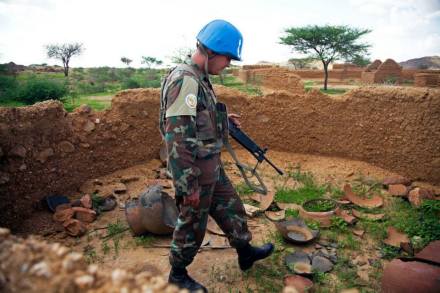Looking into South Africa’s more recent involvement in Peacekeeping Missions in Africa. Here, on 2 August 2010. South African National Defence Force (SANDF) Lieutenant Justin Heath, from Boksburg (greater Johannesburg), forms part of the UN peacekeeping mission to the Sudan for 7 months.
He is seen here patrolling in Tiksas, a village abandoned by the population some years ago due to the war in Darfur.
The War in Darfur is a major armed conflict in the Darfur region of Sudan, that began in February 2003 when the Sudan Liberation Movement (SLM) and Justice and Equality Movement (JEM) rebel groups began fighting the government of Sudan, which they accused of oppressing Darfur’s non-Arab population. The government responded to attacks by carrying out a campaign of ethnic cleansing against Darfur’s non-Arabs. This resulted in the deaths of hundreds of thousands of civilians and the indictment of Sudan’s president Omar al-Bashir for genocide, war crimes, and crimes against humanity by the International Criminal Court.
Estimates of the number of human casualties range up to several hundred thousand dead, from either combat or starvation and disease. Mass displacements and coercive migrations forced millions into refugee camps or across the border, creating a humanitarian crisis.
The Sudanese government and the JEM signed a ceasefire agreement in February 2010, with a tentative agreement to pursue peace. However, talks were disrupted by accusations that the Sudanese army launched raids and air strikes against a village, violating the Tolu agreement. The current situation is that the JEM, the largest rebel group in Darfur, vowed to boycott future negotiations.
Operation Cordite in Sudan began in July 2004 with the deployment of South African National Defence Force staff officers and observers to Darfur, Sudan, in support of the African Union Mission in Sudan (AMIS) It was an African Union (AU) peacekeeping force operating primarily in the country’s western region of Darfur with the aim of performing peacekeeping operations related to the conflict in Darfur.
The AU mission was terminated in December 2007 when it was integrated into the United Nations mission to form the UN African Mission in Darfur (UNAMID) in January 2008. it was the first African Union-United Nations hybrid mission. An Infantry Protection Company and an Explosive Ordinance Disposal Unit were added to the deployment, which was increased further in February 2005.
Operation Cordite made an immense contribution to the successful referendum on the future of Sudan, which resulted in the relatively peaceful division of the country into two: Sudan and South Sudan. Additional South African soldiers were sent to Juba, the capital of the new country, South Sudan, to assist with security for the independence celebrations in July 2011. In addition to this, South Africa also helped secure the air space for the duration of the celebrations. South Africa also trained police, prison officials and air traffic controllers: currently stationed at Juba International Airport
However typically, successful military operations are so often undermined by political antics of governments and Operation Cordite is no different.
In April 2016, South Africa withdrew it UN forces from Sudan, ending Operation Cordite after a short and unspecific Presidential statement – coincidentally and unsurprisingly it was marred with controversy and against a backdrop of political scandal which started in June 2015 when President Omar Al Bashir – who was visiting South Africa to attend an African Union summit, was allowed to escape South Africa in a private jet.
His escape, allegedly with the connivance of President Jacob Zuma, came in defiance of an order by the South African High Court, pending a decision on whether to hand Al Bashir over to the International Criminal Court (ICC) in The Hague in accordance with international arrest warrants for genocide and crimes against humanity.
The decision remains highly controversial in South Africa today, so too South Africa’s strained relationship with the ICC (South Africa taking the standpoint that the ICC should not interfere in South Africa’s legitimate obligations to African Union AU).

The repercussions on how South Africa sees its compete military role in United Nations Peacekeeping remains to be seen, hopefully in future it will positively underpin the great work of the majority of good South African men and women who enter the armed services and have the privilege of wearing the United Nation’s “Blue Beret”.
Photo copyright Albert Gonzalez Farran / Unamid

